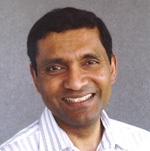Probing the Nanoscale - From Technology to Biology
The
Featuring H. Kumar Wickramasinghe, Ph.D.
Professor, Electrical Engineering and Computer Science
The Henry Samueli Endowed Chair
University of California, Irvine
Location:
The University Club
Complimentary parking is available at the University Club.
For directions, please visit http://www.uclub.uci.edu/Directions.php
Please email engineerRSVP@uci.edu or call 949.824.3923 to attend. Seating is limited, so please register early.
Abstract:
Can the human genome be sequenced in a day and at an affordable cost? If this goal is achievable, it will have a major impact on the future of personalized medicine, and will revolutionize healthcare. Following a brief description of the development scanning probe microscopy, this lecture will discuss how to address such questions by creating novel instrumentation that builds on what scientists and engineers have learned thus far.
Understanding the human composition has occupied the minds of great scientists and engineers for centuries, and microscopes have played an essential role in the study of cells and organisms over the past 300 years. The introduction of Scanning Microscopy can be traced back to the first century A.D. Following a brief survey of the development of classical scanning microscopy methods, Professor Wickramasinghe will discuss the emergence of modern day Scanning Probe Microscopy, or near-field microscopy, and highlight some key microscopy applications that have significantly impacted the development of technologies such as disc drives and silicon chips. He will then discuss the work he is developing at UC Irvine, aimed at the next stage of advancement for novel instrumentation, which will provide new capabilities for probing and observing the nanoscale in biology. Technologies range from probing the chemistry of single living cells, to ultra-fast, low-cost sequencing of the human genome for personalized medicine.
About the Speaker: H. Kumar Wickramasinghe, Ph.D., received his B.Sc. in 1970 and his Ph.D. in 1974 in electrical engineering from the
H. Kumar Wickramasinghe, Ph.D., received his B.Sc. in 1970 and his Ph.D. in 1974 in electrical engineering from the
Holding 70 patents, some of his most significant inventions and contributions to the nano field include the development of the vibrating mode atomic force microscope (AFM), the magnetic force microscope, the electrostatic force microscope, the Kelvin probe force microscope, the scanning thermal microscope, and the apertureless near-field optical microscope. Most of these scanning probe microscopes are standard instruments used today for nano-scale characterization.
His AFM jet device for rapid molecule sorting and delivery was recently named one of the 25 most innovative products of 2006 in the inaugural “MICRO/NANO 25” competition held by the editors of R&D magazine and the MICRO/NANO Newsletter.
Wickramasinghe is an IBM Fellow and a member of the IBM Academy of Technology, as well as a Fellow of the American Physical Society, the
Share
Upcoming Events
-
MSE Special Seminar: Decarbonizing Industries for a Climate-resilient Future - From Renewable Energy to Sustainable Material Recovery
-
MAE 298 SEMINAR: Technology Developments for FIR Bolometric Detector Focal Plane Assemblies
-
CBE 298 Seminar: The Wisdom of the Crowd: Watching Bacterial Collectives (Re)shape Themselves
-
CEE Seminar: BIM and the Digital Twin
-
MSE Special Seminar: Revolutionizing Battery Technology - Engineering Quantum Materials for Enhanced Safety and Performance in Solid Electrolytes
